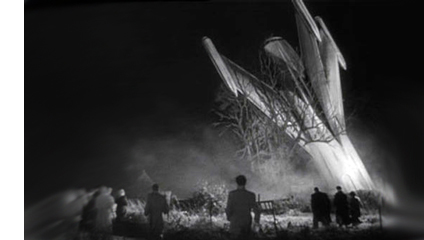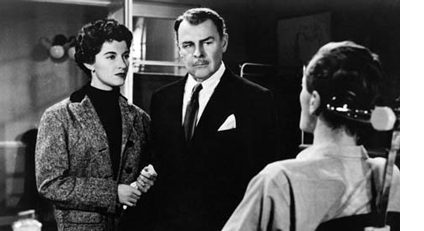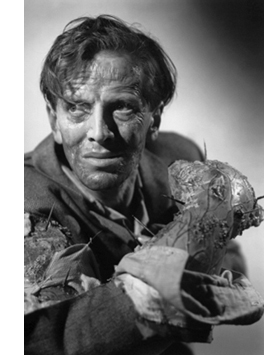
 |
|
|
|
The Quatermass Xperiment holds a high roost in filmed science fiction. it cemented the popularity of British Sci-fi filmmaking, in a more serious vein than the more juvenile American approach. Enormously popular on release, Xperiment enabled its maker Hammer Films to get a leg up in the industry. Adapted from Nigel Kneale's sensationally popular 1953 television serial, the thriller unfolds as a deceptively ordinary police mystery. Kneale's very different kind of invasion from space involves not an alien armada but a biological contamination. If a ship from the tropics could bring a deadly virus to Europe, why can't a rocket mission unknowingly carry some new alien contagion back from outer space? Clever Hammer marketing guided the thriller to smash hit status by incorporating England's adults-only 'Certificate X' rating directly into its title. As the popular Quatermass character meant nothing to American audiences, United Artists imported the film as The Creeping Unknown. Under either title, Xperiment's human metamorphosis is probably the most imitated concept in filmed science fiction. Various slime creatures, blobs, and "blood rust" soon arrived from outer space or were spawned as the result of atomic radiation. Hammer's Jimmy Sangster immediately wrote X the Unknown, a knockoff tale about radioactive ooze from inside the earth. 1 
Co-writer and director Val Guest distilled Nigel Kneale's multi-part teleplay down to eighty suspenseful minutes. The story begins as professor Bernard Quatermass (Donlevy) rushes to the crash site of his rocket group's first manned spaceship. Astronaut Victor Carroon (Richard Wordsworth) stumbles alone from the sealed cockpit; his two companions are missing even though they could not possibly have left the ship. Victor is in a sickly trance and is unable to speak. Doctor Briscoe (David King-Wood) discovers that Carroon's tissues are undergoing disturbing changes. Convinced that the abrupt, stubborn Quatermass is holding her husband for his own interests, Judith Carroon (Margia Dean) hires private detective Christie (Harold Lang of Cloudburst) to spirit Carroon from the hospital. The now deranged astronaut instead kills Christie and escapes into the streets, leaving Quatermass with no choice but to help Scotland Yard's Inspector Lomax (popular English actor Jack Warner) track him down. The Professor's diagnosis of the situation is chilling: an unknown living entity entered the spaceship in flight, consumed the other two astronauts and took up residence in Carroon's body. Victor now absorbs other organisms (a cactus plant, zoo animals, unlucky humans) for raw materials. By the time Quatermass corners Carroon in Westminster Abbey, the astronaut has become a mollusk-like mass of protoplasm. Teleplay writer Nigel Kneale often transposed supernatural phenomena into science fiction terms, and in The Quatermass Xperiment demonic possession hs become parasitic infestation. The first explorers into space have inadvertently given an alien entity an opportunity to explore us. The 'space contagion' may not even be intelligent. Unlike American sci-fi compelled to reinforce the status quo regarding religion, this English production dispenses completely with the notion that the unknown is God's domain, and that scientists are trespassers. The unpleasant truth about man's place in the cosmos is that the difference between a human being and crawling vermin is apparently just a few hundred switch-throws on a helix of DNA. 
The movie is equally unsentimental about the nature of space travel; at one point Quatermass declares that there's no room for personal feelings in science. Courageous space pioneer Carroon was fully aware of the risks when he dared to test the 'waters' of outer space. It's the same progress vs. humanism problem seen in David Lean's Breaking the Sound Barrier, where an aviation executive risks the lives of his sons to test jet planes. Space travel is the most daring adventure of all, and Carroon and his fellow astronauts are 'a necessary expense.' Unlike some American movies, Xperiment has no authoritative anti-science voice lamenting the sacrifice of human beings for an unworthy goal -- the 'Nazi science' argument. It's assumed that space is man's future. When Victor Carroon returns he is treated not like a hospital patient, but a test subject in a research clinic. He's in quarantine as if he might be carrying a disease. Unfortunately, the astronaut is himself the disease. Here's a good test: find the exact point where the characters stop regarding Carroon as human, and start thinking of him as a monster. When does the change in attitude take place?
Inspector Lomax is the film's voice of humanism, a decent fellow who would like to save Carroon but doesn't want London overrun with alien monsters. The Bernard Quatermass from Nigel Kneale's TV serials was a similar humanistic fellow, a
The Quatermass Xperiment betters other modestly budgeted monster thrillers of its day because its creature is more than a man in a scary costume. Predicting the themes of early David Cronenberg films, Xperiment taps our primal fears of personal decay and disease through the pitiful, suffering astronaut played by Richard Wordsworth.
Growing inside the pathetic Carroon, the cosmic parasite is more sophisticated than the typical rubber movie monster. It rearranges his internal structure as it absorbs more living things. The creature grows differently depending on what beings it absorbs, an idea that echoes the shape-shifting creature in the famous science fiction story Who Goes There? The parasite's possession-control capability is shockingly conveyed when it compels Carroon to painfully smash his hand into a cactus plant. The resulting grotesque arm sprouts plant-like thorns; its swollen appearance also
Director Val Guest talks about giving the film a documentary flavor, presumably to break away from the laughable artificiality of the previous year's Devil Girl from Mars. Xperiment instead adopts the urban-dull look of realistic British crime films. Wandering the damp and grimy London streets, Carroon makes contact with various working-folk including Thora Hird's alcoholic street vagrant. Another effort for realism may mark the debut of "found footage" filmmaking: rocket project assistant Marsh (Maurice Kaufmann) recovers an automatic camera from the crashed rocket. When the film is processed the investigators watch a time-lapse version of what happened out in space, cueing a clever 'instant flashback' to events that occurred before the film's timeline. Guest accomplishes wonders on a low budget. A nighttime dragnet scene reportedly incorporates a few stock shots from the earlier atom extortion thriller Seven Days to Noon). Hammer's local Bray Fire Brigade was enlisted to cool the crash-landed rocket, which sticks out of the ground like a dart. Permission to bring movie cameras into Westminster Abbey was denied, so special effects man Les Bowie used static mattes to insert live action into still photos of the famous church. American Lippert arranged additional financing for Hammer films, and provided American star Brian Donlevy and co-writer Richard Landau. Lippert also nominated his actress-girlfriend Margia Dean for the film's only substantial female role. Dean receives star billing on American posters (just above) but is poorly dubbed and does not come off well. Also in the cast is war movie favorite Gordon Jackson as a TV director, and batty Lionel Jeffries as a harried "Rocket Establishment" bureaucrat. 
The film's most remarkable performance remains Richard Wordsworth's haunted-looking astronaut. The actor's mime performance neatly balances sympathy and menace, wordlessly projecting the idea that a malevolent "other" is guiding Victor Carroon's actions. As sympathetic as Frankenstein's monster, Carroon has a beautifully acted and directed Karloff-like encounter with a little slum girl. The child is played by a very young Jane Asher, who was later to become an accomplished actress (Alfie) as well as a future Paul McCartney girlfriend. The Quatermass Xperiment is a definite first, a major step forward in filmed Sci-fi. Its non-traditional xenomorphic monster conjured up all manner of blobs and things mutated by radiation or infected by nasty outer space life forms. Science fiction films of the '50s were about violent threats and distressing changes, about atomic chickens coming home to roost and the consequences of irresponsible technology. All convey our uneasy emotions about technological things to come. Xperiment sells some very dangerous notions. The cosmos might be ruled not by a god, but by cruel competitive biology. And in a future that will dictate radical changes in everything, man may change as well. Hammer Films acquired all three of the 1950s Nigel Kneale BBC Quatermass serials for adaptation to the big screen. The company followed up quickly with Quatermass 2, an even more exciting thriller, also starring Brian Donlevy as the Professor. The third installment was delayed by seven years while the studio pursued its lucrative gothic horror subjects. Packed with imaginative and intellectually stimulating ideas, Nigel Kneale's Quatermass trilogy is now considered a high point of classic British science fiction filmmaking. The KL Studio Classics Blu-ray of The Quatermass Xperiment is a very welcome addition to British Sci-Fi on HD, just one week after the BFI's release of another classic by the same director, The Day the Earth Caught Fire.
The movie has had a rocky history on home video as seen, but all legitimate discs have offered the original British version. This can be traced back to George Feltenstein at MGM Home Video in 1995. For a VHS release, George asked for transfer materials to be sought in England. Planned for an MGM 'Midnite Movies' DVD release in 2002, the title was dropped from the schedule several years in a row. I reported
Kino Lorber's new release finally delivers a solid Blu-ray with appropriate extras, formatted for the first time at its original widescreen aspect ratio of 1:66. The video quality is very good. Although substantial digital cleanup was performed a few scratches are still present along with other signs of age. That everything fits so well in the widescreen image is a surprise; judging by the full-screen transfers, the main title artwork looked too tall. Kino's extras give us a great deal of input from director Val Guest, who passed away in 2006. Prime Hammer historian Marcus Hearn hosts Guest for a long, excellent sit-down video interview, and also for an audio commentary. Guest is candidly enthusiastic about his career. Both are from 2003 The newest extra is a short piece with director John Carpenter, whose 1982 The Thing is still the best thriller to depict an invasive, shape-shifting monster first visualized in Xperiment. Carpenter's best remarks center on his childhood experiences thrilling to scary matinee attractions like The Creeping Unknown. His remarks on his own collaboration with Nigel Kneale are unfortunately brief -- they apparently did not get on well. Carpenter says that actress Margia Dean's voice was replaced only for America, but I don't think that's true because the awkward dub we're listening to is the U.K. track. 
Val Guest is back for From Reality to Fiction, an interview featurette made in 2002 for the aborted MGM Midnite Movies release. Most of what he says are the same stories from the Marcus Hearn interview. A second version comparison feature shows what was cut out to make The Creeping Unknown, explains a few anomalies in the credits and shows all three title treatments, one salvaged from an old Sinister Cinema tape loaned by Todd Stribich. Ernest Dickerson's Trailers from Hell trailer commentary piece for United Artists' 1956 The Creeping Unknown is included, as well as a clean (and 1:37 flat) copy of the same original trailer. It hypes every horrific moment in the show but foolishly reveals the mystery monster right off, spoiling the suspense. So watch the movie proper first.
On a scale of Excellent, Good, Fair, and Poor,
The Quatermass Xperiment Blu-ray rates:

Reviews on the Savant main site have additional credits information and are often updated and annotated with reader input and graphics. T'was Ever Thus.
Review Staff | About DVD Talk | Newsletter Subscribe | Join DVD Talk Forum |
| ||||||||||||||||||